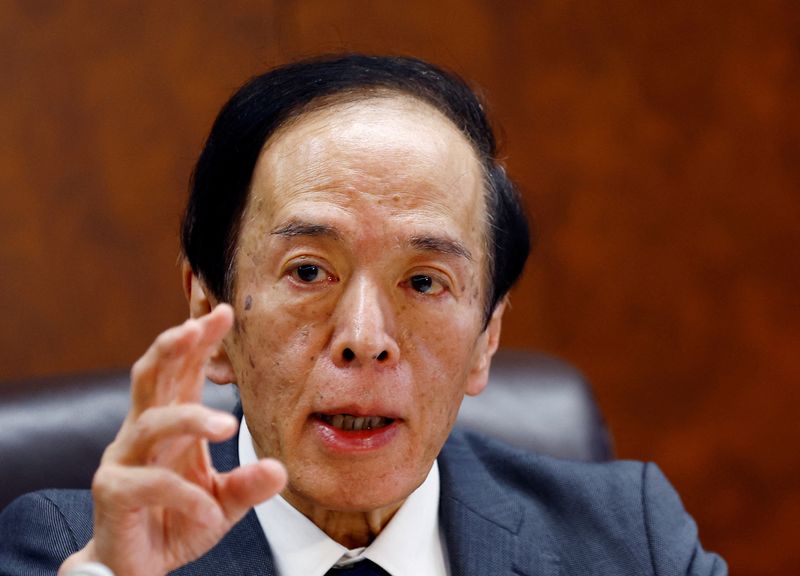By Leika Kihara
TOKYO (Reuters) -Bank of Japan policymakers are increasingly talking up the need to shift away from the massive monetary stimulus of the past decade, even as growing global risks heighten concerns about a fragile economic recovery.
A series of hawkish comments by BOJ speakers in recent weeks suggest the bank is preparing markets for an eventual policy change amid growing price pressures in deflation-prone Japan, analysts say.
Even dovish members of the BOJ board have expressed an openness to talk about a long-awaited exit from the extremely accommodative policy of former governor Haruhiko Kuroda, acknowledging changes in conditions may warrant a tweak in monetary settings.
Governor Kazuo Ueda told a newspaper interview on Saturday the BOJ could get enough data by year-end to judge whether conditions are in place to raise short-term interest rates.
Ueda's remarks, which pushed up the yen and bond yields on Monday, followed those of BOJ board member Naoki Tamura last month that suggested the bank could safely hike short-term rates without hurting the economy.
"Even if the BOJ were to end negative rates, it won't be scaling back monetary easing as long as it can keep interest rates low," said Tamura, a former commercial bank executive.
The commentary contrasts in tone to the pro-growth posture adopted under Kuroda, an advocate of aggressive monetary easing to shock Japan out of its deflationary mindset.
It also suggests the BOJ under Ueda will be more inclined to prioritise unwinding the Kuroda-era policy framework, which has been blamed for distorting bond markets and crushing bank margin.
"The BOJ will proclaim that Japan has achieved 2% inflation and end negative rates in April," said Mari Iwashita, chief market economist at Daiwa Securities and a veteran BOJ watcher.
To be sure, the BOJ is in no rush to phase out stimulus until there is enough data suggesting the economy can withstand the impact of weakening global demand and allow firms to keep hiking wages, say three sources familiar with its thinking.
But growing signs of change in Japan's deflation-prone economy are making policymakers more open to discussing the hurdles for an exit, a sign they see decision-time approaching.
Inflation has exceeded the BOJ's 2% target for more than a year as companies pass on higher costs to households. Firms also offered the largest pay hikes in three decades.
Even doves in the nine-member board have noted these changes.
"I believe Japan's economy is finally seeing early signs of achieving the BOJ's 2% inflation target," said Hajime Takata, one such board member.
"We need to patiently maintain the current massive monetary stimulus. At the same time, we need to respond nimbly against uncertainties as we're seeing early signs of a positive cycle emerge" between wages and inflation, he said.
Another board member, Junko Nakagawa, laid out the conditions for ending negative rates, notably a continued improvement in household confidence.
"When we see many people share prospects that wages will keep rising, we may be able to exit (negative rates)."
NO PRE-SET TIMING
Since taking the helm in April, Ueda has moved steadily toward phasing out stimulus. The BOJ tweaked policy in July to allow long-term rates to rise more reflecting higher inflation.
The next step would be to ditch or hike a 0% target set for the 10-year bond yield, and raise short-term rates from -0.1%.
Policymakers' recent remarks suggest the BOJ could act sooner than markets expect. A majority of analysts polled by Reuters in August saw the BOJ scaling back stimulus only in a year's time. Less than half expect negative rates to end in 2024.
There seems to be no consensus within the BOJ board, however, on when or how the bank would dismantle Kuroda's complex policy framework.
Ueda said the BOJ could end negative rates if it believed that inflation would sustainably hold above the target.
His deputy Shinichi Uchida appeared to set a higher bar for ending negative rates, saying last month there was "still a long way to go" before conditions were met.
Next year's wage outlook remains key.
Japanese firms traditionally kick off their spring "shunto" wage negotiations with unions in March. But the BOJ could get information before those talks through its regional branch offices and comments from corporate executives on the wage outlook, the sources said.
The global outlook would also be crucial with a downturn in the U.S. and Chinese economies hurting manufacturers and discouraging pay hikes, the sources said.
"There's so much uncertainty on the outlook for wages and Japan's economy," one of the sources said. "The BOJ probably doesn't have a pre-set timing in mind on when it can take the next step."
